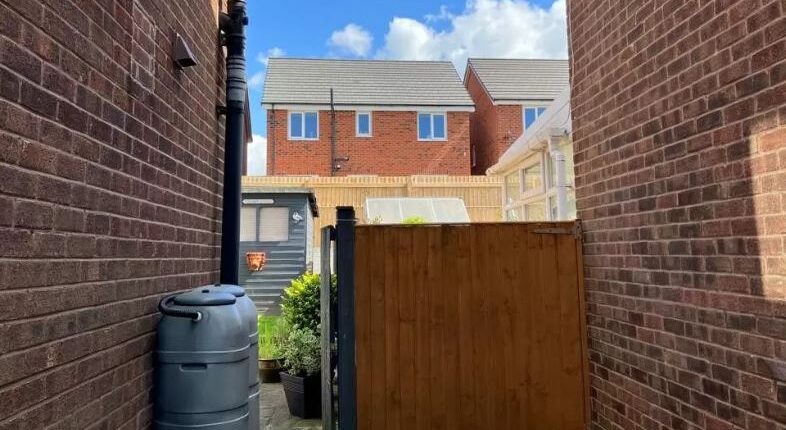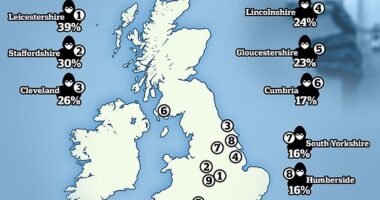FURIOUS locals have slammed newbuild properties on their street – as new residents can see them getting into bed.
People living near Pottery Gardens in Cheadle, Staffordshire, claim the properties were constructed two metres higher than planning permission approved.
Outraged residents feel “ill” after they claim to have lost all privacy – and catch neighbours peering into their bedrooms.
One affected local, Rosa Oulsnam, who has lived on the road for more than 40 years, told the BBC: “It’s just awful, you get up every day and you see nothing but homes overlooking you.
“It’s very distressing.”
Another fed-up resident, Tina Cross, claimed people “can actually see me sitting on the bed” from Pottery Gardens properties.


“The houses have been built too high and too close, invading our privacy,” she added.
She explained their outlook had “gone from a field with cows in and bushes, to a wooden and brick jungle.”
Homeowner Tracy Milward previously claimed: “This development has been built in breach of the planning application submitted.
“They have built too high, and too close to the surrounding properties.
Most read in Money
“Consequently ours, and many of our neighbours’ properties, are now dwarfed and dominated by this unsightly development.”
Even town councillor, Paulette Upton agreed, and added: “The plain fact is the developers have blatantly breached the planning permission and we seem to have allowed that to happen.”
Persimmon Homes had been granted planning permission by Staffordshire Moorlands District Council in December 2020 for the 125 new homes of Pottery Gardens.
They reject local claims that houses were built higher than the approved height in their application.
“The houses have been built at the correct finished floor levels specified in the original approved application”, a spokesperson told the BBC.
But, a recent planning committee meeting in March saw the developer seeking retrospective planning permission to change ground levels on site.
The chairman warned those living in the estate if permission is refused, some could see their homes demolished.
Justin Price-Jones, a legal advisor, agreed and warned there could be “very serious consequences” if councillors denied the application.
Staffordshire Moorlands District Council, told the BBC the application “was recommended for approval but was deferred so that discussions could take place between the developer and residents to consider boundary improvements”.
A Persimmon North West spokesperson said: “Since the recent planning committee meeting we have spoken to the owners of all nine properties and have contacted the owners of neighbouring properties to agree dates to meet with them.
“We will continue to work closely with the council to engage with local residents and agree solutions that satisfy all parties.”
Councillor Peter Jackson, of Cheadle Town Council, said: “If they have built the houses in accordance with the planning permission, why would they have to go back to the planning authorities for retrospective permission?
“The two don’t make sense.”
This comes as residents living in Solihull, West Mids, claim their dream homes have become a nightmare as yobs ruin their lives.
Homeowners on the estate say they’re plagued by gangs smoking “weed constantly” and kids racing up and down on motorbikes.
And Camden locals fear their new-build properties will be demolished as they claim they’re trapped in “uninsurable” homes.


Some flats in Agar Grove sold for between £700,000 and £900,000, are now valued at £0, the owners said.
What are your rights in retrospective planning permission?
A local planning authority can invite a retrospective application, according to Gov.uk.
You should submit your application without delay.
Although a local planning authority may invite an application, you must not assume permission will be granted.
A person who has undertaken unauthorised development has only one opportunity to obtain planning permission after the event. This can either be through a retrospective planning application or an appeal against an enforcement notice – on the grounds that planning permission should be granted or the conditions should be removed.
The local planning authority can decline a retrospective planning application if an enforcement notice has previously been issued.
No appeal may be made if an enforcement notice is issued within the time allowed for determination of a retrospective planning application.












